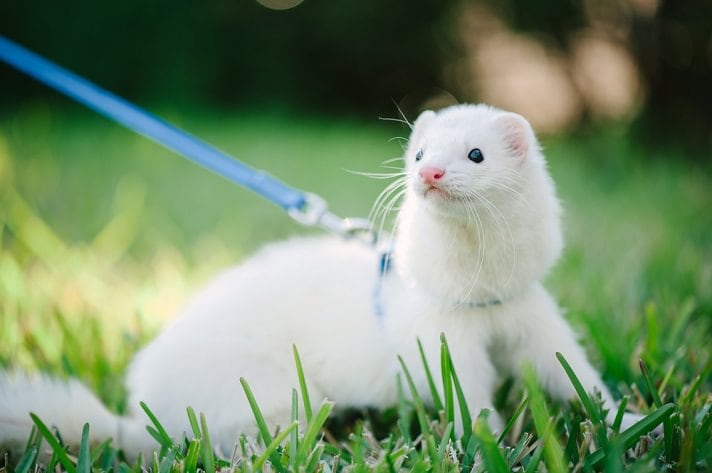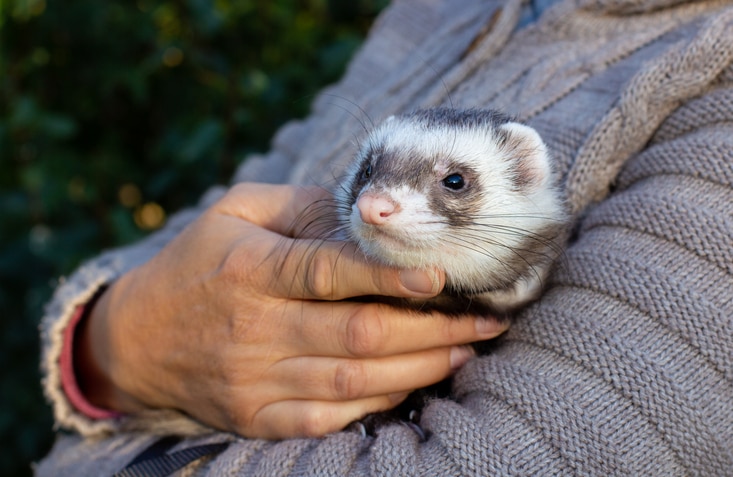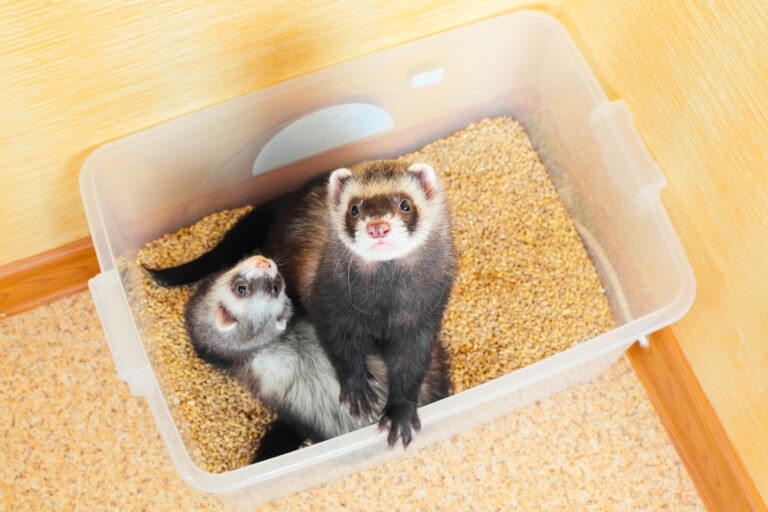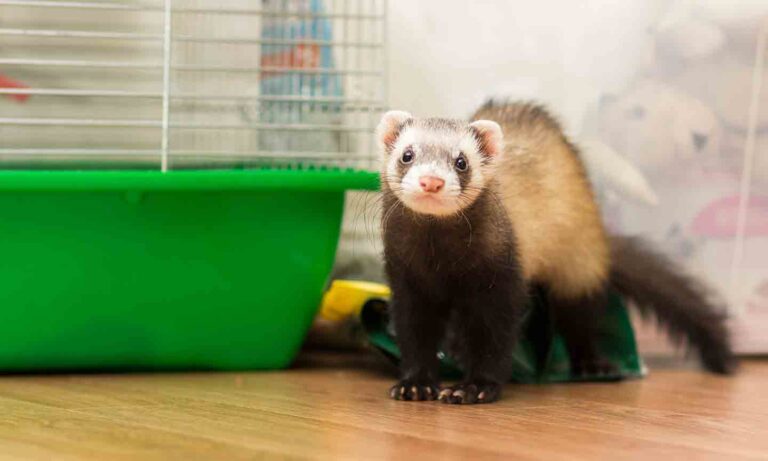10 Steps For Fun, Safe Outdoor Walks With Ferrets

Photo by White Domestic Ferret/Shutterstock
The days are getting longer and the weather is getting warmer. It is time to think about bringing springtime and your ferrets together. An introduction to the great outdoors is not only enriching for your ferrets, but also just the thing for burning off the winter fat and expending some of that pent-up springtime energy. I’m mostly speaking for myself, but it can’t hurt the ferrets either!
Taking your ferret outside is not a dangerous thing to do — as long as you take a few precautions.
- First, make sure your ferret is up-to-date with its vaccinations. Nothing would be worse than taking a ferret outside only for it to come down with canine distemper or rabies.
- Also, keep your ferret on a leash and harness, which you can find where stores sell ferret supplies. This prevents it from escaping down a gutter or animal burrow, and also gives you the opportunity to snatch it back in a hurry if an aggressive dog gets too close. If your ferret is not already trained to a harness, now is the time to get started. Just put one on your ferret and let it get used to wearing the harness indoors before going outside. Your ferret may flop on the floor or attempt to remove the harness. I take that time to give the ferret treats and physical play to get its mind off being in the harness. It will likely take several attempts before your ferret gets used to wearing a harness, so start early. I have not found an easy way to get a ferret used to a leash; I just use it, and the ferret and I work out the problems as we walk along.
- I recommend the first outdoor excursions to be around the home. This allows the ferret to get used to the outdoor environment while still in a secure area. If your ferret is older and not used to going outside, it may react with some fear and not want to move. That’s OK; just pull up a chair and wait. It may take a few attempts, but most ferrets eventually start to explore rather than implore you to take them back inside. Patience is very important, so don’t rush your ferret.
- Some ferrets may never decide the outdoors is a fun place to explore. With these ferrets, go with the flow. Don’t stress your ferret by forcing it outside. Instead, bring some of the outdoors in to them. Grass clippings, leaves and other outdoor objects can be placed in a box for your ferret to climb through.
- Most ferrets taken outdoors will start exploring the moment their cute, little paws touch the ground. The problem with these ferrets is not getting them to look around, but rather trying to keep the leash from tripping you, or getting your ferret tangled in a bush.
- Most people expect exploration dangers to include cars, deep holes and dangerous animals. However, joggers, bicyclists and skateboarders can be as bad or worse — ferrets are small animals that can be difficult to notice by someone moving fast. There have been several times I’ve had to take rapid action to prevent my ferret from being squished (I’ve come to call bicycles “die-cycles” because of a few close calls).
- Another danger is that ferrets could eat something potentially poisonous or dangerous for them. I simply cannot explain why a ferret will turn up its nose at nutritious food, only to go outside and sicken itself by eating a poisonous plant. Pesticides and poisons are obvious, but perhaps more dangerous are garden plants, small bites of which could cause bowel blockages, bacterial infections or just plain poisoning. I feed my ferrets before going outside so that hunger doesn’t spur dietary experimentation, but I still watch those little weasels like an eagle. If a ferret looks like it is chewing something, I take away the item as soon as I can.
- Ferrets, like most carnivores, seem to like to roll around in other animal’s poopy messes, so you need to watch for that as well. Nothing can draw a ferret to a spot on the lawn faster than a pile of the fresh stuff, except maybe a bigger pile. Unless you want to have your veterinarian check your ferret for parasites and your dry cleaner to check for nasty spots on your clothes, try to keep your ferret away from those poop piles.
- Parasites are always a problem. Mosquitoes, ticks, chiggers and fleas seem to lie in wait in the exact spots a ferret wants to explore. Every year I pull ticks off my ferrets and comb fleas from their fur. Prevention helps (talk to your veterinarian about the best preventives for your area), but even with such precautions, your ferret can still take home some of the little beasties. I always give a ferret back from an outing a complete look over before returning it to the home population. A bright penlight, a flea comb and a tick remover are essential equipment. I give my ferret some of its favorite food and, while it munches, I prowl for naughty bugs hiding in its fur. When finished, I generally wipe down the fur with a damp washcloth to make sure it is clean. You never know when a roll in the poop was done behind your back.
- If given the choice between walking down the road or sniffing the stuff that is encountered and playing with outside toys, most ferrets choose to sniff stuff every time. A ferret is built to sniff, and trying to identify new odors is one of the most enriching things a ferret can do. So, when you take your exploratory hikes, go to different places and take differing routes. Keep it smelling new, and you ferret will thank you ever so much, usually with a pile near the door. But, hey, that is what a ferret does, right?
Bob Church is a former photojournalist and current zooarcheologist with degrees in biology (zoology) and anthropology (archaeology). He resides in Missouri with 19 ferrets that keep his chicken blender overheated and his heart overfull.











